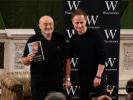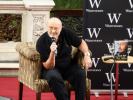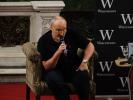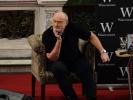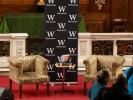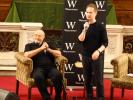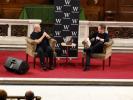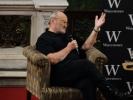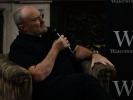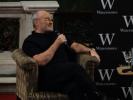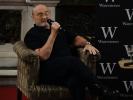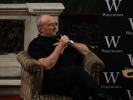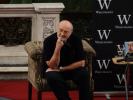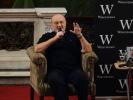“It’s written in the book” - The Waterstones press launch interview for Phil’s Not Dead Yet autobiography transcribed by Alan Hewitt. Photographs by Stuart Barnes.
Phil Collins round three saw Stuart and I ensconced in the lovely surroundings of a church for the launch of Phil’s autobiography. Having had our chance to ask Phil our own questions on the days preceding this, we kept quiet and let others have their chance and here is what they (and Phil) had to say…
INT: We have heard about the health problems and your accident the other day, are you OK?
PC: Pardon? (laughs). I am sixty five you know, bits wear out and I can still do shows and I can still hear. Surgery last year was the last thing that happened and it left me with this numb foot but that will come back but that is why I am using this (points to walking stick) it is not because of old age…my musical history records that I have been playing since I was five years old and that is sixty years of playing drums and it does take its toll you know, bits wear out, my hips are shot and my back through bad posture..
INT: It was a Stratford kit you bought wasn’t it? And you say in the book that after watching Ringo Starr, you would recognise Ringo Starr’s drum kit anywhere Did you want to get out from behind the kit or did you want to be like Ringo Starr? |
|
PC: Well, at thirteen there was a lot of that. I somehow thought that if I looked into what I did I would be better and that was a bit of vanity but I grew up in a period where this was anew thing and The Stones, the Pretty Things and The Beatles they were all bands that you kind of wanted to be like and this was a kind of revolution and emulating musicians was something that was on my mind.
INT: But it was always rock music that you were playing, it wasn’t big band dance stuff like you then did with the Phil Collins Big Band?
PC: No, we are talking about 1963 here and but the time you got to ‘66 and as well as the Stones and The Beatles and the band associated with that pop era, I was also listening to Count Basie, Buddy Rich and the big band stars which I always wanted to be part of and hence the Big Band thirty years later
INT: Did you always secretly want to get out front? |
|
PC: No, that was like the worst possible position in a band to me. A singer was held in a little bit of contempt because they didn’t have to do anything apart from just look good and that was something I never thought I would be able to do (laughs). So singing was never something that I wanted to do.
INT: So when you did get out front,…
PC: I never made anything of the fact that Peter wore his wife’s dress (laughs) because this was the epic… this was cutting edge at the time and Peter did things that were fantastic and over the years I have become the person who has belittled that but at the time it was cutting edge and that was all good. I just felt that when I took over by default I was given the short straw and was given the job and I didn’t want to be the singer but I did it because we wanted the band to continue and it was not something that I felt I could do or without some…but I did feel very comfortable taking over what Peter was doing but what Peter did you know, getting us on the front page of Melody Maker many times and it was something nobody else was doing at the time.
INT: And you proved yourself wrong by selling millions of records! It always strikes me that Genesis were .. They weren’t as noodly as Yes and they weren’t a bunch of virtuosos like Emerson Lake And Palmer were but they were ploughing their own furrow and there are some bits in this book such as Mike Rutherford being happy with clean sheet and a cup of cocoa and while you were playing drums in the studio Mike and Tony were on a country walk …
PC: Yeah, the clean sheets and cocoa I always thought was a great line because Tony and Mike would always say yeah, clean sheets, cocoa and it was quite nice, you know (laughs) those cold, crisp clean sheets and cocoa … (laughs) And we did, oh god we did many tomes drive at half three in the morning and we would pick up some strawberries and some carrots and some cheese and some bread and we would nip off and go down some quiet country road and have picnic.
INT: This is cutting edge ambient Prog Rock why wouldn’t you?
PC: Why wouldn’t you? A slab of cheese and some bread…
INT: I Mentioned earlier on the records you sold with the band and the records you sold as a solo artist. What was it like working in a band, did you all agree … |
|
PC: I wrote everything (laughs) its funny really because I think we all had…it seems to me and yet I had to live this thing instead of talking about it and when you are living it it is slightly different. I mean we were a BAND we all had our strengths and we all had our weaknesses and at that time before Peter left, I wasn’t a writer and my strength was when Tony brought this song or steamrollered this song (laughs) or Peter wrote something or even Mike wrote something and I say those three because Steve was less so. We… my job was…I could just see how these things could be arranged and that was my strength and it wasn’t until much later that I started to write. Se we all had our roles within the band and as far as I was concerned there was no pecking order within it. They were the grammar school guys and I was the stage school guy and Steve was the dark one but we all had our roles.
INT: Because a drummer makes or breaks a band and you have always got to be there…
PC: He does, yeah. I always said to myself that a band is as good as its drummer and you can have a great band and a lousy drummer but if you have a good band and a fantastic drummer and I don’t mean that the way it sounded! (laughs) and I felt the buck stopped where I was and I don’t mean that to sound as big headed as it obviously sounds, but I do feel that an average band with an average drummer will sound average and an average band with a good drummer will sound better.
INT: So when you went solo … (laughs) and you started writing your own songs for yourself, you are more than just a drummer how does that feel?
PC: I think what comes over in this book and sometimes it needs someone else to see this, is that there is a lot of insecurity and I went through my great sorrow if you like, the divorce and I started to write and found that I actually got things out of me that and eventually of course, when the album came out, people related to that. Bu it was always… well that was lucky! I wonder what’s going to happen next?
INT: That comes across in the book when you were with Genesis because you had had theses hit records but you lost a lot of money the first few years and you are still thinking what’s going to happen next? And you never know if the next thing is going to work…
PC: I never felt confident that what I was going to do would be liked and when you do it once then you have to do it again and actually second albums are the worst, the most difficult things to do because in theory at any rate, you have done your best stuff on your first album then you have got the pick of whatever’s left and whatever is new so. |I always felt that you didn’t… I just wasn’t sure whether you could continue this and the more it did well, the bigger the fear of how could you do something that was as good as this? And as successful as this?
INT: I am surprised to hear you say that because you are one of the most prolific artists I can think of and this is a mighty slim volume for all the stuff you have done. It’s not part of a trilogy is it? (laughs). |
|
PC: There was a period that and I have to mention Craig McLean who worked on this and who is a good mate of mine and I wrote the first part of this book in one way or another and then in 2010 I got on to the music and we met each other and he came in and made some sense of all of the music stuff and we went through this, we sat there for months talking and him recording and it was how much I had worked and there was one year where I did this and I did that and so there was a most extraordinary amount of work but it was all what I would call fun. Music is meant to be fun and there was a lot of stuff happening then and I wouldn’t change any of it, I enjoyed every minute of it.
INT: Was there a time when you realised that you realised how famous you were? Fame has no redeeming features as far as I am concerned and I am sure you'd feel similar?
PC: If people like what you do and I find it does no harm to say yes to because you are doing things, you are writing stuff and playing with people and making records and if people like them and what more is there than the fulfilment of what you do… It is nice to have that feeling that someone else has been touched by what you do.
And on that reflection on fame we leave this fascinating chat. Once again our thanks to Jo Greenwood at TSPM for making it possible for us to attend this event and for everything else over what was a marvellous few days of Phil-related activity!
